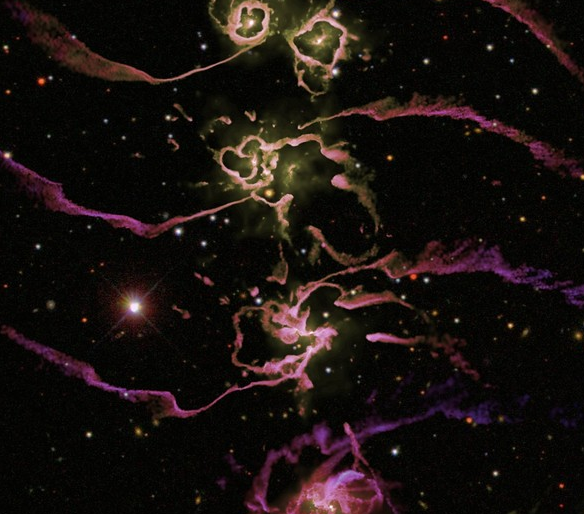GADGET – Code

GADGET is a freely available code for cosmological N-body/SPH simulations on massively parallel computers with distributed memory. GADGET uses an explicit communication model that is implemented with the standardized MPI communication interface. The code can be run on essentially all supercomputer systems presently in use, including clusters of workstations or individual PCs.
GADGET computes gravitational forces with a hierarchical tree algorithm (optionally in combination with a particle-mesh scheme for long-range gravitational forces) and represents fluids by means of smoothed particle hydrodynamics (SPH). The code can be used for studies of isolated systems, or for simulations that include the cosmological expansion of space, both with or without periodic boundary conditions. In all these types of simulations, GADGET follows the evolution of a self-gravitating collisionless N-body system, and allows gas dynamics to be optionally included. Both the force computation and the time stepping of GADGET are fully adaptive, with a dynamic range which is, in principle, unlimited.
GADGET can therefore be used to address a wide array of astrophysically interesting problems, ranging from colliding and merging galaxies, to the formation of large-scale structure in the Universe. With the inclusion of additional physical processes such as radiative cooling and heating, GADGET can also be used to study the dynamics of the gaseous intergalactic medium, or to address star formation and its regulation by feedback processes.
The code can be downloaded at the
The principal references for the code are the papers:
- The cosmological simulation code GADGET-2
Springel V. (2005)
Monthly Notices of the Royal Astronomical Society, 364, 1105 [ADS] - GADGET: a code for collisionless and gasdynamical cosmological simulations
Springel V., Yoshida N., White S. D. M. (2001)
New Astronomy, 6, 79 [ADS]
About HITS
HITS, the Heidelberg Institute for Theoretical Studies, was established in 2010 by physicist and SAP co-founder Klaus Tschira (1940-2015) and the Klaus Tschira Foundation as a private, non-profit research institute. HITS conducts basic research in the natural, mathematical, and computer sciences. Major research directions include complex simulations across scales, making sense of data, and enabling science via computational research. Application areas range from molecular biology to astrophysics. An essential characteristic of the Institute is interdisciplinarity, implemented in numerous cross-group and cross-disciplinary projects. The base funding of HITS is provided by the Klaus Tschira Foundation.